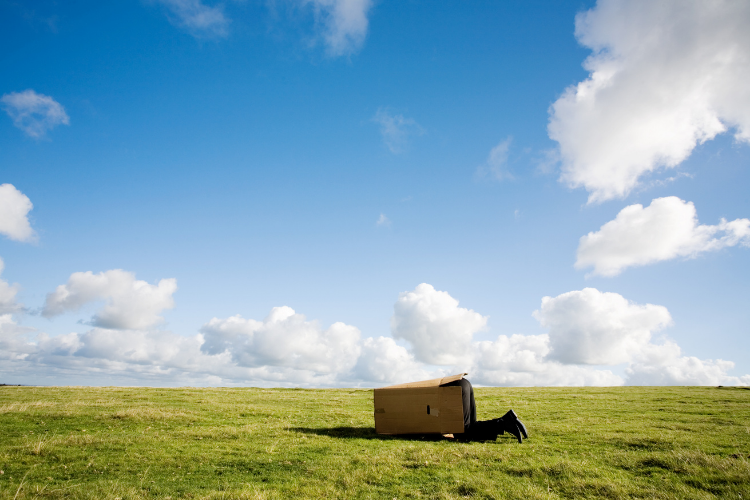
Aoife Connell
Counsellor - Psychotherapist
Signs of Denial and What Can You Do About it?

Many of us have had experiences in our lives that have caused us emotional and psychological distress. One of the ways our brains cope with these experiences is through denial. We deny the negative impact these experiences have had on us. We all do this at some point in life in order to get through. We deny the death of a loved one, we deny that we’re in an unhealthy relationship, we deny a lie we told to protect ourselves from criticism. Maybe you are in denial and could benefit from learning more about it and the ways it might be affecting you.

What is Denial?
In order to know if we’re in denial, we first need to know what it actually is. Denial, as defined by the Merriam-Webster dictionary, is “the refusal to admit the truth or reality of something”. It is usually an unconscious process that happens without even knowing we’re doing it. There are different kinds of denial and they can impact us in different ways. We’ll get into all of this below as well as some of the ways you can move past denial if you feel it is holding you back in your life.

Can Denial be a Good Thing?
Psychologically speaking, denial is a coping mechanism that gives us time to adjust to a distressing situation. So we can say that denial is definitely not all bad. It’s something that can be necessary and helpful. Sometimes we need time and space from an event or situation before we are able to process the impact it has had on us. Otherwise, we become overwhelmed by it. Our brains will do what they have to do to get this space, this is where denial comes in to save the day.
There is a flip side to this though. Denial is only helpful for limited periods of time and in low quantities. If we stay in denial long-term it can lead to feelings of anxiety, depression and isolation. When we are in denial and are not dealing with how something has impacted us, our emotions get “stuck” and cause these kinds of problems for us. Denial can even have detrimental consequences in certain cases. For example, if someone is in denial about how much money they’re spending. They may continuously avoid checking their bank account balance, spending without knowing how much money they actually have. Eventually leading to debt and a disastrous financial situation that takes years to get out of. Getting to this point with denial can make it even harder to face. This means that staying in denial can affect our ability to deal with challenges as they arise in our lives, leading to overwhelm and a lack of resilience.

Although denial can be necessary to help us through something, its likely to catch up with us eventually and start causing some serious problems.
So, How Do You Know if You’re in Denial?
Denial might be a problem for you if:
- You find yourself in repetitive situations and patterns in life, such as your relationships or job where you see recurring problems and difficulties that you feel you can’t get away from.
- You use a lot of superlative language eg. “always”, “never” about yourself and other people and tend to play “the blame game” when issues arise.
- You find it very difficult to tolerate being questioned or confronted and only spend time with people who agree with your opinions and perspectives.
- You experience thoughts and feelings about yourself and your life that you push aside or hurry to distract yourself from.
- You tend to minimize experiences you’ve had in your life, making light of something you’ve been through despite how serious it is.
- You find yourself needing to rationalise certain behaviours, denying the full reality. For example, “it’s fine to keep drinking this much because I’m still able to get up for work in the morning” when deep down you are worried it may be a problem.
- You find yourself putting the responsibility or blame for the things you’re unhappy about onto other people or groups of people.
- You are dissatisfied in your life and relationships but find it difficult to make changes.
If you find yourself identifying with the above, you may be struggling with denial.

What Next?
An important thing to remember is that being in denial won’t actually change the reality of a situation. Nor will it successfully stave off the impact it’s having on your wellbeing or the uncomfortable feelings being stirred up inside. If you think denial may be affecting you, here are some ways to begin to come out of it:
- Try Journalling
Try writing about how you’re feeling, allowing yourself to be as honest as possible. This can help to start facing the truth of how you really feel about something and give you a clearer idea of where you’re at in your life.

- Take Time to Reflect
Really consider the negative impact denial may be having on your life. Is it keeping you stuck in old patterns? Are life’s challenges feeling too overwhelming? Taking an honest look at the ways denial is really affecting you can be a good step towards finding a new way forward.
- It’s OK to Feel
One of the biggest reasons for denial is that we’re afraid to face difficult feelings like grief, anger, resentment and pain to name a few. It’s important to remember that it’s ok to feel all of these things. It’s actually essential for our wellbeing. If we don’t feel them, they fester and ultimately become even more daunting. Feeling anger doesn’t make you a bad person, and feeling pain won’t kill you. There are healthy ways to express these emotions and learning to do so will positively impact your life and relationships. Feeling these difficult emotions is part of facing the denial you’re in. It will also help prevent using denial as a way to cope in the future.

- Don’t Be Afraid to Seek Help
You may be feeling overwhelmed and unsure of where to begin. Or you’ve tried some of the above steps but feel you are stuck. Perhaps you need a supportive environment where deeper truths can be explored in a safe way. If this is the case, you might benefit from professional support. Sometimes we are so entrenched in denial that we need the help of a therapist or counsellor to really come to terms with and work through it. A therapist can help you to build emotional resilience and find alternative coping mechanisms to deal with life’s challenges. This will make for a better quality of life and more fulfilling relationships with yourself and others. Seeking help can be a difficult but ultimately rewarding step to take. It’s important to remember that you don’t have to deal with challenges alone.

Facing up to denial may seem daunting right now, but it will be worth it when you realise that denial only hurts you in the long run and is keeping you from living a more satisfying and enjoyable life. You deserve to live a life free from the constraints of denial.
Additional Sources :
mayoclinic.org
Talkspace.com






